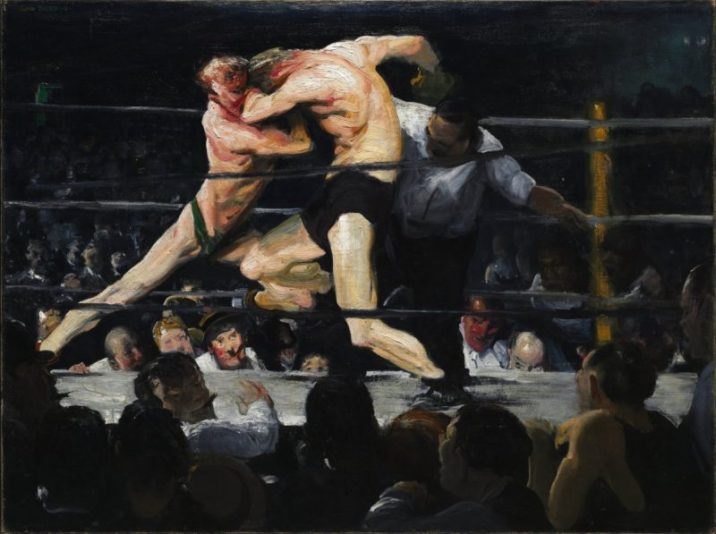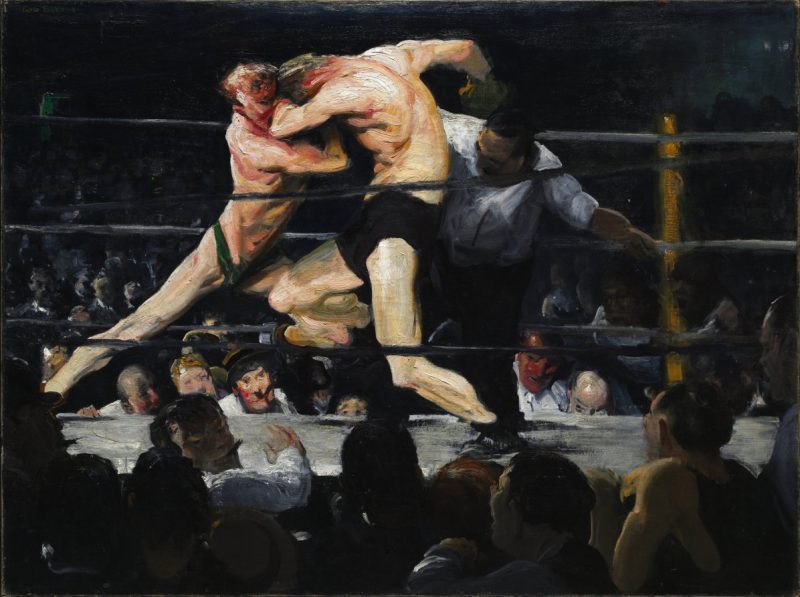Ἀγωνίζομαι is a Greek word commonly abused by Bible interpreters; and I think it raises an interesting test case for what to do when major Bible translations differ. In this post, I want to try to discern what that word is used to mean in its various contexts.
Ἀγωνίζομαι is a verb used seven times (click to run a Logos search). BDAG says it has two senses, “compete” (as in an athletic contest) and “fight.” The latter sense also has a common metaphorical extension: “struggle.” Muhammad Ali had “fights” watched by millions, but he also faced “struggles” against Parkinson’s.
In all but one of the New Testament contexts in which ἀγωνίζομαι is used, it seems pretty apparent which of the two common meanings the author intends.
- I discern no hint of athletic competition in Luke 13:24 when Jesus says, “Strive to enter through the narrow door.” So he must have meant “struggle.”
- Likewise in John 18:36 when Jesus says, “If my kingdom were of this world, my servants would have been fighting,” he’s clearly not talking about sports.
- But in 1 Cor 9:25, there is a definite contextual emphasis on athletics: “Every athlete [ἀγωνιζόμενος] exercises self-control in all things. They do it to receive a perishable wreath, but we an imperishable.” Paul goes on immediately afterwards to speak of running, boxing, and disciplining his body—all athletic activities.
- Colossians 1:29 is a context that pushes us back to the “struggle” sense; Paul is “struggling”and “toiling” to “present everyone mature in Christ.”
- Later in Colossians, Epaphras similarly is “struggling” in his prayers for the Colossians. There may be a flavor of the athletic sense here; the NIV uses the word “wrestling.” The context is perhaps not fully determinative in this case.
- Paul’s famous phrase in 1Timothy 6:12, “Fight the good fight,” is the second-to-last use of ἀγωνίζομαι in the New Testament. There is a possibility that the “many witnesses” who, Paul says, have been watching Timothy points toward the athletic sense.
- And that brings us to 2Timothy 4:7, a context which definitely includes an athletic metaphor. Here’s the ESV:
I have fought the good fight, I have finished the race, I have kept the faith.
Everyone who reads the first line of this verse knows thatPaul is using a metaphor. But what’s the vehicle of that metaphor? Is it military or athletic—fighting or competing? Almost all major modern English translations agree that it’s the former.
But not all. The NET Bible,the Good NewsBible, and the New American Bible (Rev.) go for the other major option:
I have competed well; I have finished the race; I have kept the faith! (NET)
I have competed well; I have finished the race; I have kept the faith. (NAB)
I have done my best in the race, I have run the full distance, and I have kept the faith. (GNB)
Notice that each of these translations—and therefore, let’s be clear, the flesh-and-blood scholars who put them together—rejected the united tradition of English Bible translation going back to Tyndale and read the word ἀγωνίζομαι differently than the majority. They see Paul using two athletic metaphors rather than one military and one athletic.
Pre-Conclusion
I’m inclined to trust the majority in this case, though I think the outliers have done us a good service. Here are my reasons for maintaining the existing rendering (in order of strength, from weaker to stronger):
- I probably naturally tend in a conservative direction when it comes to Bible translations. If the long tradition of English Bibles is almost wholly united, I need a really good reason to rock the boat I grew up in. (Remember, I’m starting with weak reasons!)
- “I have fought the good fight” is so pithy—I hate to lose it. The phrase has made it into the Christian (and even the cultural) lexicons for good reason. “I have competed the good competition” is the kind of phrasing that will get a new translation laughed into out-of-print status.
- “I have fought the good fight” has the advantage of agreeing with 1 Tim 6:12, where Paul says, “Fight the good fight”—a passage in which he doesn’t employ any athletic imagery. It strikes me as a stock phrase, almost, something Paul may have used other times in personal conversation or just self-talk.
- There is also the little fact that I have omitted to mention till now that athletic imagery continues into the next verse: “Henceforth there is laid up for me the crown of righteousness.” This is, as Mounce and other commentators point out, is an athlete’s prize.1 It is still possible, of course, that “fight the good fight” is military imagery, and only after it does Paul switch metaphors—but this is a strong reason to lean away from the military view.
- And I find this last reason determinative: “Fought the good fight” actually has the advantage of covering both possible meanings, “fight” or “competition.” That’s because some fights are competitions—namely pugilistic ones: boxing matches. Notice that “boxing” is one of the things the “athlete” (ἀγωνιζόμενος) does in 1 Cor. 9:25–26.
So I suggest we stick with “I have fought the good fight” for now, and when we teach and preach the phrase, mention that it could be either an athletic or a military metaphor—or perhaps both (see Knight’s NIGTC volume, 459). Language has that kind of flexibility.
Reflections on using the Greek New Testament
One major reason you learned Greek was so you could have an intelligent grasp of the interpretive options in any given case. It may be frustrating to you that a precise and certain answer—military or athletic?—is not forthcoming. I myself have leaned both ways during my study. But I haven’t leaned toward viewing it as an agricultural or familial metaphor, or one drawn from politics or neuroscience. Knowledge of Koine Greek and its world does give me some definite limits.
And whether you know Greek or not, this post exemplifies why even scholars should read multiple Bible translations. Translation differences force you to ask questions you might not think to ask otherwise, like, “What is this metaphor anyway, a military one or an athletic one—or is it both?”
If you teach or preach this passage, you don’t have to get into the nitty gritty details of senses in the lexicon. But, depending on your audience, you probably should mention the two ways to take the metaphor.
Application
Whether you see the metaphor in 2 Timothy 4:7 as military or athletic, Paul’s course was a hard one, requiring toil and struggle. Few flowery beds, little ease.
And either way you go (or both) the insightful and rigorous commentator Philip H. Towner’s observation about this passage still applies:
You will scarcely ever find that when a person prays, some empty and external reflection does not impede him, causing the attention which the mind directs on God to be sidetracked and interrupted. So it is a great and most wholesome struggle to concentrate on prayer once begun, and with God’s help to show lively resistance to the temptations of the enemy, so that our minds may with unflagging attention strain to be ever fastened on God. Then we can deservedly recite Paul’s words: I have fought a good fight, I have finished my course, I have kept the faith.
Keeping Pauline usage in mind, the application here is necessarily broad, viewing the whole of life as an intense struggle against an opposition in which spiritual power must be matched by personal commitment and resolve to last to the end of the contest. This is not the language of one about to be released from prison, but rather speaks of one who has contended honorably and well to the end of the contest; it is thus an apt metaphor for life lived responsibly at more than just the physical level.2
Christian views of sanctification can go through pendulum swings in individual lives and among Christian groups—from let-go-and-let-God to Pelagian self-effort. I don’t believe that we are saved by grace and sanctified by works. The Bible takes a balanced view. All is of grace; everything is through him and to him and for him, that he may be all in all.
But our rhetoric in opposition to legalism (or Pelagianism) must never make it impossible for us to talk the way Paul did. Like a soldier and/or boxer, he toiled. He strove. He fought the good fight.

- William D. Mounce, Pastoral Epistles, vol. 46, Word Biblical Commentary (Dallas: Word, Incorporated, 2000), 582.
- The Letters to Timothy and Titus, New International Commentary on the New Testament (Grand Rapids: Eerdmans, 2006), 612.






